广东省珠海九中九年级英语全册《Unit 14 Have you packed yet-Section B 2》课件 人教新目标版
- 格式:ppt
- 大小:9.15 MB
- 文档页数:32
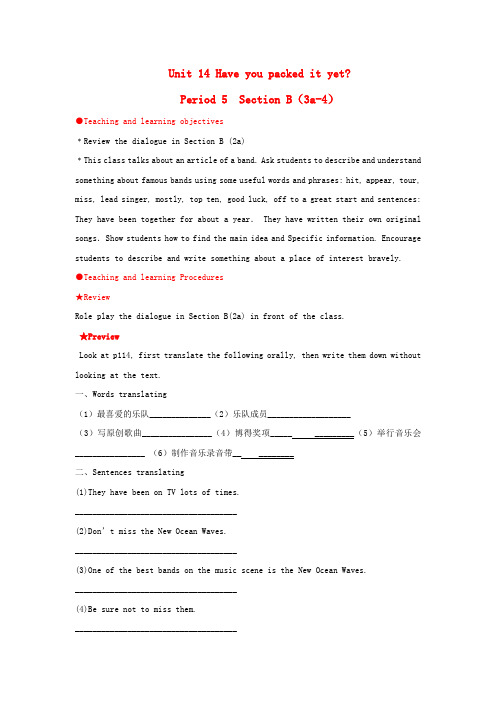
Unit 14 Have you packed it yet?Period 5 Section B(3a-4)●Teaching and learning objectives﹡Review the dialogue in Section B (2a)﹡This class talks about an article of a band. Ask students to describe and understand something about famous bands using some useful words and phrases: hit, appear, tour, miss, lead singer, mostly, top ten, good luck, off to a great start and sentences: They have been together for about a year. They have written their own original songs.Show students how to find the main idea and Specific information. Encourage students to describe and write something about a place of interest bravely.●Teaching and learning Procedures★ReviewRole play the dialogue in Section B(2a) in front of the class.★PreviewLook at p114, first translate the following orally, then write them down without looking at the text.一、Words translating(1)最喜爱的乐队______________(2)乐队成员___________________(3)写原创歌曲________________(4)博得奖项_____ _________(5)举行音乐会________________ (6)制作音乐录音带__ ________二、Sentences translating(1)They have been on TV lots of times._____________________________________(2)Don’t miss the New Ocean Waves._____________________________________(3)One of the best bands on the music scene is the New Ocean Waves._____________________________________(4)Be sure not to miss them._____________________________________(5)We really hope to have a number one hit some day._____________________________________(6)Good luck to the New Ocean Waves._____________________________________设计思路:预习表现了以学生为中心的思想,强调学生的参与、体验、感知、实践和交流,以学定教。
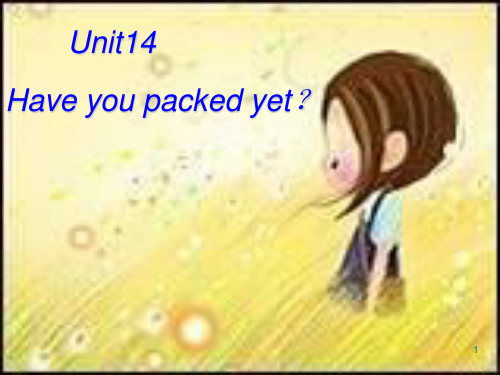
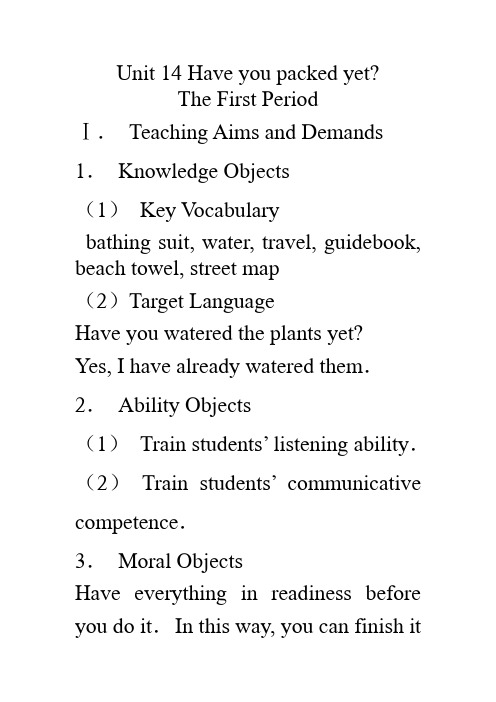
Unit 14 Have you packed yet?The First Period Ⅰ.Teaching Aims and Demands 1.Knowledge Objects(1)Key V ocabularybathing suit, water, travel, guidebook, beach towel, street map(2)Target LanguageHave you watered the plants yet? Yes, I have already watered them.2.Ability Objects(1)Train students’ listening ability.(2)Train students’communicative competence.3.Moral ObjectsHave everything in readiness before you do it.In this way, you can finish itperfectly or have a good time.Ⅱ.Teaching Key PointTarget LanguageⅢ.Teaching Difficult Points 1.How to train students’listening ability.2.How to train students’communicative competence.Ⅳ.Teaching Methods 1.Listening-and-answering activity to help the students go through with the listening material.2.Pairwork to make every student work in class.Ⅴ.Teaching Aids1.A tape recorder2.The blackboardⅥ.Teaching ProceduresStep ⅠRevisionT: Last week we finished Unit 13.In this unit, we learned how to talk about how things affect us.For example, Loud music makes me tense.That movie made her sad.Now I ask some students to make sentences with the structure…make me…S1: Parties make me excited.S2: School vacations make me happy.S3: That movie made me want to leave.S4: The story made me cry.S5: The awful picture makes me nervous.T: Very good.From today on, we will learn Unit 14.Now.I ask a student to come to the blackboard and write the numbers 1 to 20 on the blackboard.(After the student has written the numbers 1 through 5, start talking to the rest of the class)T: Has he written the number 1 yet? Class repeat the question.Has he written the number 1 yet?S s: Has he written the number 1 yet? T: (Pointing to the number 1 on the board)Yes, he has already written the number 1.Class repeat.Yes, he hasalready written the number 1.S s: Yes, he has already written the number 1.T: (Writing the word already on the blackboard)This is the word already.Class repeat.Already.Look at the blackboard.(pointing to the blackboard)Has he written the number 50 yet? Class repeat the question.Has he written the number 50 yet?S s: Has he written the number 50 yet? T: (Pointing to the highest number already on the blackboard)No, he hasn’t written the number 50 yet.Class repeat.No, he hasn’twritten the number 50 yet.S s: No, he hasn’t written the number 50 yet.T: (Writing the word yet on the blackboard)Tish is the word yet.Class repeat.Yet.Now, look at the two words already and yet.Which one is used to talk about things that have happened in the past? SSs: Already.T: Yeah.Very good.So the other word yet is used to talk about things that will happen in the future.Yeah? SS: Yes.Step Ⅱ1aThis activity introduces key vocabularyand helps students review vocabulary they already know.Read the instructions aloud to the class.Say, Who can give an example of a beach vacation and sightseeing in a city? Ask a student to give the example.(bathing suit, travel guidebook)Get students to add some things to the lists under the two headings.A beach vacation and Sightseeing in a city.Have students do the work individually first.While they are working, walk around the classroom checking the progress of the students.Let students tell the class the wordsthey wrote.Write the words on theblackboard.Read them and letstudents repeat.Then ask otherstudents to add other words to the lists.Step Ⅲ1bThis activity gives students practice in understanding the target language in spoken conversation.Look at the picture.Ask, What canyou see in the picture? (There is afamily in the picture.They are gettingready for a beach vacation)Point to the box.Invite a pair of students to read the conversation to the class.A: Have you packed the beach towels yet?B: No, I haven’t.Look at the six chores on the list.Let students read each item, then ask different students to explain the meaning of each item in their own words.Make sure students understandthe meaning of each item.Go throughthe instructions with the class.Point to the blank lines in front of each item in the list.Say, You will hear a familytalking as they get ready to go on vacation.Listen carefully.Make sure what the family talks about and put a checkmark in front of each chore that is already done.Play the tape.The first time studentsonly listen.Play the tape a secondtime.Now listen to the tape again.This time please put your checkmarks on the correct blanks.Check the answers with the whole class.TapescriptWoman: Have you packed the beach towels yet?Boy: No, I haven’t.Can’t Judy pack them?Woman: No, she’s busy.Could you please water the plants?Boy:I’ve already watered them.Woman: Oh, thanks.Man: What about the travel guidebookand the street map?Woman: I’ve already bought the travel guidebook, but I haven’t got the street map yet.Man: That’s OK.I’ll get it.Have you packed the camera?Boy: Yes.I’ve already put it in mysuitcase.Woman: Well, I guess that’s everything.Boy: Almost everything.We haven’tlocked the windows yet.Step Ⅳ1cThis activity provides guided oral practice using the target language.Go through the instructions with the whole class.Look at the example inthe box.Invite a pair of students toread it to the class.S A: Have you watered the plants yet?S B: Yes, I have already watered them.Tell students they will be making conversations with a partner.Lookback at the chores in Activity lb.Say, Now look back at the chores in Activity lb.Make conversations talking about what the family members have already done and what they haven’t done yet, using words from the chores, such as packed the camera, locked the windows, bought a street map.While students are working in pairs, walk around the classroom and listen to some pairs.If necessary, offerlanguage support.Then get severalpairs of students to say their conversations to the class.Conversation 1S A: Have they packed the camera yet? S B: Yes, they have already packed the camera.Conversation 2S A: Have they bought a street map yet? S B: No, they haven’t bought a street map yet.Notes1.pack—(here)get ready for a journey by doing this 2.guidebook—book for travellers, tourists, etc, with information about a place3.Have you watered the plants yet? Yes, I have already watered them: PresentPerfect Tense.The structure is have+p.p.Pay attention to the two wordsalready and yet.Already is used in affirmative sentences; while yet is used in negative and interrogative sentences.Step ⅤSummaryIn this class, we’ve learned some important words, such as water, travel, guidebook, beach towel.We’ve alsolearned the target language.Have you watered the plants yet? Yes, I have already watered them.Step ⅥHomeworkMake conversations in pairs to review the target language.Step ⅦBlackboard DesignUnit 14 Have you packed yet?The Second Period Ⅰ.Teaching Aims and Demands 1.Knowledge Objects(1)Key V ocabulary refrigerator, garage, suitcase, clean out, put in, turn off(2)Target LanguageHave you watered the plants yet?No, I haven’t.Have you packed the camera yet? Yes.I’ve already put it in my suitcase.Have you fed the cat?No.I haven’t fed her yet.2.Ability Object(1)Train students’ listening ability.(2)Train students’ speaking ability.3.Moral ObjectWe must be ready with our work before we do it.Ⅱ.Teaching Key Points1.Key V ocabularyclean out, put in, turn off2.Target LanguageHave you watered the plants yet? No, I haven’t.Have you packed the camera yet? Yes.I’ve already put it in my suitcase.Have you fed the cat?No.I haven’t fed her yet.3.StructuresHave you packed the camera yet? Yes.I’ve already put it in my suitcase.Have you fed the cat?No.I haven’t fed her yet.Ⅲ.Teaching Difficult Points 1.the target language2.How to train students’listeningability.Ⅳ.Teaching Methods 1.Listening method to improve the students’ listening ability.2.Pairwork to make every student work in class.Ⅴ.Teaching Aids1.A tape recorder2.The blackboardⅥ.Teaching ProceduresStep I RevisionCheck homework.Get some pairs to read their conversations.Collect their conversations and help students correct any mistakes.Step Ⅱ2aThis activity provides guided listening practice using the target language.Look at the picture.Ask, What can you see in the picture? (A boy and a girl are in the kitchen.They both look a little stressed out)Go through the instructions with the class.You will hear a boy and a girl talking about getting ready to go on vacation.Write M after each thing that Mark says and T after each thing that Tina says.Look at the sample answer.Say, Tina said, No.I haven’t cleaned out the refrigerator yet.Get students to repeatNo.I haven’t cleaned out the refrigerator yet.Play the recording for students the first time.This time students only listen to the recording.Play the recording a second time.This time let students write Min front of Mark’s statements, and T in front of Tina’s statements.Check the answers with the class.Answers1.T 2.T 3.M 4.T 5.M 6.T TapescriptBoy: Mom and Dad said they want to leave in ten minutes.Are you ready, Tina?Girl: No.I haven’t cleaned out the refrigerator yet.I have to do that rightnow.Boy: Tina! You’re unbelievable.What about your bike?Girl: I’ve already put it in the garage.But I haven’t locked the garage yet.That’s your job, Mark.Boy: I know.I’ve already done most of my jobs.I’ve taken out the trash.Girl: Have you fed the cat yet?Boy: Not yet.I’ll do it in a minute.Have you turned off your radio?Girl: Yes, I have.I think we’re almost ready.Step Ⅲ2bThis activity provides guided listening practice using the target language.Go through the instructions with the class.Look at the list of questionswith blanks in front of each one.Then look back at the statements in Activity 2a.Say, Some of the statements in Activity 2a are answers to questions in Activity 2b.Write the number of the correct answer from Activity 2a in front of each question in Activity 2b.Get several students to read the questions in Activity 2b to the class.Look at the sampleanswer.Ask a student to read thequestion and answer to the class.Are you ready, Tina?No, I haven’t cleaned out the refrigerator yet.Play the recording for students.Let students write their answers in the blanks.Play the recording again if necessary.Correct the answers.AnswersHave you fed the cat yet? 5What about you bike? 2Are you ready, Tina? 1Have you turned off your radio? 6 Step Ⅳ2cThis activity provides guided oral practice using the target language.Look at the sample conversation in the speechbubbles.Invite a pair of students to read it to the class.S A: Are you ready, Tina?S B: No.I haven’t cleaned out the refrigerator yet.Go through the instructions with the class.Say, With your partner make a conversation using information from Activities 2a and 2b.Have students work in pairs.While they are working, walk around the classroom checking the progress of the pairs and offering help as needed.Invite two pairs to say their conversations to the class.Conversation 1S A: Have you fed the cat yet?S B: Not yet.I’ll do it in a minute.Conversation 2S A: Have you turned off your radio?S B: Yes, I have.Step ⅤGrammar FocusLook at the grammar focus box.Get three students to read the questions and answers to the class.Have you watered the plants yet? No, I haven’t.Have you packed the camera yet? Yes.I’ve already put it in my suitcase.Have you fed the cat?No.I haven’t fed her yet.Let students make up other sentences in pairs using have you…yetquestions.For example: Have you had lunch yet? Have another student answer truthfully: Yes, I have or Yes, I have already had lunch, or No, I haven’t had lunch yet.Pay attention to the use of already and yet.Say, When we use the words have and already, we are talking about something that happened in the past, but not a long time ago.When we use the words haven’t and yet, we are talking about something that will happen in the future, but not a long time from now.It will happensoon.For example: I’ve already hadbreakfast, but I haven’t had lunch yet.Draw a simple diagram to help students understand the grammar focus.Get some pairs to say their sentences aloud to the class.A sample sentenceI’ve already had lunch, but I haven’t had supper yet.Culture noteMany Americans are used to taking at least one vacation trip a year.But in China, some of the students may not be in the habit of taking an annual vacation, or even making a trip to another city.For some students, financial limitations and family obligations make such travel impossible.For others, it may be that taking trips is not something that is common in their home culture.Step ⅥSummaryIn this class, we’ve learned key vocabulary clean out, put in, turn off and the targetlanguage Have you watered the plants yet? No, I haven’t.Have you packed the camera yet? Yes, I’ve already put it in my suitcase.Have you fed the cat? No.I haven’t fed her yet.Step ⅦHomeworkGet students to write some sentences according to the target language.Step ⅧBlackboard DesignUnit 14 Have you packed yet?The Third Period Ⅰ.Teaching Aims and Demands 1.Knowledge Objects(1)Key V ocabularychop, wood, light, village, well, farm (2)Target LanguageHave you bought a newspaper?Yes, I’ve already bought a newspaper.2.Ability Objects(1)Train students’ integrating skills.(2)Train the ability of expressing students’ own opinions.3.Moral ObjectsWe should make a plan for our everyday activities and make a schedule.It can remind us how tospend the time.It is good for ourstudy and life.Ⅱ.Teaching Key PointTrain students’ integrating skills.Ⅲ.Teaching Difficult PointHow to improve students’integrating skills.Ⅳ.Teaching Methods1.Fast-reading method 2.Groupwork and pairwork Ⅴ.Teaching Aids1.A projector2.The blackboardⅥ.Teaching ProceduresStep I RevisionT: Yesterday we learned the target language.The structure is Have you…yet? Yes.I’ve already…Have you…? No.I haven’t…yet.Now who can make sentences using thestructure?S1: Have you turned off your radio yet? S2: Yes.I’ve already turned it off.S1: Have you finished your homework? S2: No.I haven’t finished it yet.T: Very good.Step Ⅱ3aThis activity provides reading practice using the target language.Show the key vocabulary words on the screen by a projector.Read the words and ask students to repeat again and again until they can pronounce the words fluently and accurately.Before reading the e-mail message, askthe students what chores do you usually do? Please tell me.(do my homework, clean my room, water the plants, clean our classroom etc.)Go through the instructions with the class.Look at the e-mail message.Let a student read the e-mail aloud to the class.Correct any pronunciation errors to make sure the student is providing a good model for the rest of the class.Get students to read the e-mail message individually, and underline the different chores on their own,Check the answers with the class.Answers1.do my homework2.take the dog for a walk3.water my mom’s plants4.do some shopping5.chop wood6.light the fire7.collect water8.feed the animalsLet students read the e-mail again for further comprehension.While they are reading.Walk around the classroom, offering help if they have any words or phrases they don’t understand.Notes1.chore—small duty or piece of work, especially ordinary everyday task(in the home, on a farm, etc.)In the e-mail message, there are manychores, such as do my homework, take the dog for a walk, water my mom’s plants.2.chat—talk about unimportant things3.kid—(sl)child; young person4.well—(here n.)shaft, usually lined with brick or stone, for obtaining water from an underground source 5.anyway—in any possible way; by any possible meansStep Ⅲ3bThis activity provides reading, writing.listening and speaking practice using the target language.Look at the pictures of the three people and read their names aloud to the class.Then point to the chart.Let studentsread the information in it.Make sure students understand the information in the chart by asking questions and point out things.T: Look at the three pictures above the chart.Under each person is a list of the things he or she has done or will do today.Now look at the chart.What do you see in the first column?S1: Numbers.Clock times.T: That’s right.Those are clock times.Those times show what the three people were doing at 9:00,at 10:00,and so forth.It is 12:00 noon now.so the 1:00 and 2:00 times show things they will do later today.What has Steve already done?S2: He’s already done his homework.He’s already bought a newspaper.He’s already fed the dog.T: That’s correct.What things hasn’t he done yet?S3: He hasn’t watered the plants.Hehasn’t cleaned his room.T: OK.Very good.Go through the instructions with the class.Put students in several groups.Say, Each student in a group will decide to be one of the people.The other students in the group will ask questions to find out which person in the chart he or she has decided to be.Make sure students understandhow to do the exercise.Look at the example in the box.Invitea pair of students to read it aloud to the class.S A: Have you bought a newspaper?S B: Yes, I’ve already bought a newspaper.Ask students, which of the three people could it be? Can you find out? Yeah.It could be Steve or Elise.Get students to do the work in groups.While they are working, move around the classroom checking the work of each group.Ask two groups to do the work as the examples.Group 1: Have you watered the plants? S1: Yes.I’ve already watered the plants.Group 2: Have you fed the dog?S2: No.I haven’t fed the dog yet.(Person 1: Kathy; Person 2: Elise)Step ⅣPart 4This activity provides reading, writing, listening and speaking practice using the target language.Go through the instructions with the class.Invite a good student to give an example of things that he or she has and hasn’t done this week: I have done my homework.But I haven’t done some shopping.Put students in some groups of three.Let students complete the work in groups.Finish the table.Review the task.Get some groups to share the results of their surveys.Ask students to write their ownschedules, listing the time of day they do each thing.Then get students towork in pairs.Student A thinks of oneactivity.Student B gets five tries to guess the activity.Then student B thinks of an activity and student A guesses what it is.Step ⅤSummaryIn this class, we’ve learned some key vocabulary words such as chop, wood, light.village, well, farm.We’ve also done a lot of reading, writing and speaking practice using the target language.Step ⅥHomework1.Finish off the exercises on pages57~58 of the workbook.2.Get students to talk about the things they have done and they haven’t done yet this week in pairs.Step ⅦBlackboard DesignUnit 14 Have you packed yet?The Fourth Period Ⅰ.Teaching Aims and Demands 1.Knowledge Objects(1)Key V ocabularymember, original, songs, award(2)Target LanguageHave they been on TV yet?Yes, they’ve been on TV lots of times.2.Ability Object(1)Train students’speaking and listening ability.(2)Train students’ability to understand the target language in spoken conversation.(3)Train students’ ability to use the target language.3.Moral ObjectLove music and you can benefit from it.Ⅱ.Teaching Key Points1.Key V ocabularymember, original, songs, award 2.Target LanguageHave they been on TV yet?Yes, they’ve been on TV lots of times.Ⅲ.Teaching Difficult Points 1.How to train students’ speaking and listening ability.2.How to use the target language.Ⅳ.Teaching Methods 1.Listening method 2.Groupwork to make every student work in class.Ⅴ.Teaching Aids1.A tape recorder2.The blackboardⅥ.Teaching ProceduresStep I RevisionCheck homework.Ask some pairs to say their conversations to talk about the things they have done and they haven’t done yet this week.S A: Have you done your homework?S B: Yes, I’ve already done my homework.S A: Have you cleaned your room?S B: No, I haven’t cleaned my room yet.Step ⅡPart 1This activity introduces key vocabulary, and helps students review vocabulary they already know.Look at the picture.Ask, What can you see in the picture? (A man is playing the guitar and singing a song)Point to the box.Invite a student to read the four questions.Make sure students understand the questions.Get students to fill in the blanks on their own. A moment later, ask several students to read their answers to the class.Notes1.favorite—(adj.)best liked 2.What is your favorite band?—What band do you like best? 3.band—group of persons who play music together4.band member—member of a bandStep Ⅲ2aThis activity gives students practice in understanding the target language in spoken conversation.Look at the picture.A record agent isinterviewing members of a band.Letstudents read the instructions.Point to the headings and the blank lines following each heading.You will hear a woman interviewing members of a band.They are talking about the band.Now, listen and write your answers on these blank lines.Play the recording the first time.Thistime students only listen.Play therecording a second time.This time, ask students to write their answers on the blank lines as they listen to the recording.Play the tape again ifnecessary.Check the answers with the class.AnswersBand’s name: Apple Ice CreamHow long they’ve been together: About a yearNumber of concerts they’ve done: Six TapescriptWoman: Hmmm.That was…umm…not bad.Now tell me a little aboutyourselves.What was your name again?Boy 1: Apple Ice Cream.Woman: Apple Ice Cream? That’s。
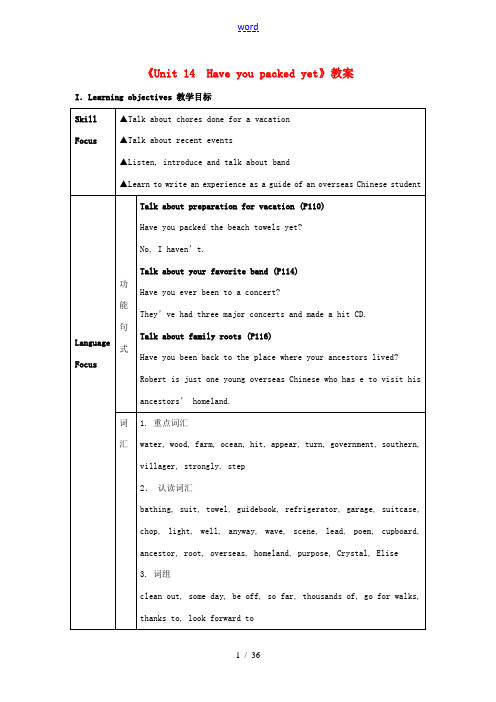
《Unit 14 Have you packed yet》教案I.Learning objectives 教学目标II. Teaching materials analyzing and rearranging 教材分析和重组1. 教材分析本单元以Preparing for a vacation 为话题,共设计了四个部分的内容:Section A该部分有4个模块: 第一模块围绕Have you packed the beach towels yet? 这一话题展开口语(1a,1c)、听力(1b)训练; 第二模块围绕 Talking about recent events 进行大量的听力(2a-2b)、口语(2c)训练; 第三模块继续围绕 Talking about different chores这一话题展开口语(3b)和阅读(3a)训练;第四模块围绕The things you have to do this week 进行列表并展开小组及个人活动(4)。
Section B该部分有4个模块:第一模块是围绕Talking about a band 这一话题展开口语训练(1);第二模块围绕Talking about members of a band 进行听力(2a,2b)和口语(2c)训练;第三模块继续围绕Talking about a band 进行阅读(3a)和写作(3b,3c)训练;第四模块拓展为采访训练(4)。
Self check该部分有2个模块:第一模块是词汇的学习与运用(1);第二模块就本单元的中心话题进行对话阅读和写作训练(2)。
Reading该部分共设置了5项任务:第一项任务以问题讨论的方法激活学生相关背景知识;第二项任务要求学生通过快速阅读获取信息;第三项任务利用讨论、写作等练习形式加深学生对阅读内容的理解;第四项任务要求学生能运用所学知识解决实际问题;第五项任务要求学生运用所学知识展开实践活动.2.教材重组和课时分配Period 1 (Section A: 1a, 1b, 1c, 2a, 2b, 2c)New function presentingPeriod 2 (Section A: 3a, 3b, 4; Section B: 1, 2a, 2b, 2c, 3a, 3b, 3c, 4) PracticePeriod 3 (Self check: 1, 2; Section 4)Self checkPeriod 4 (Reading: Section 1-Section 3)ReadingIII. Teaching plans for each period分课时教案Period 1 New function presentingLanguage goals 语言目标1. Words && expressions 生词和短语bathing, suit, towel, water(v.), guidebook, refrigerator, clean out2. Key sentences 重点句子( P111)I haven’t cleaned out the refrigerator yet.Have you fed the cat yet?Not yet. I’ll do it in a minute.Ability goals 能力目标Enable the students to understand and talk about recent events and the chores people have to do before a vacation.Emotion && attitude goals 情感与态度目标Enable the students to make preparations independently before a vacation. Strategy goals 策略目标Brainstorming.Culture awareness goals文化意识目标Learn the differences between western and Chinese vacation.Teaching important points 教学重点The Present Perfect tense.Teaching procedures and ways 教学过程与方式Step I Revision and Lead-in ( 1a: P110)Ask two or more students to show their work and how they did it.T: In the last unit, you were asked to write a passage about a story which happened last weekend, using the Past Tense. Now I’d like to know who’d like to display your project on the classroom wall.A sample version:On the morning of last weekend, my friend Kangkang and I were on the way to FenghuaPark when we found a tree bent, we felt very sorry for the tree and set out to do something to help it. We straightened the tree by tying it to a stick. We put a rope around the tree and put up a notice, which read, “Take Care of Trees”. When we finished working, we all felt tired.When we got to the park, it was almost 12:00. It was very hot, we felt tired and hungry. But we were happy and very satisfied with what we had done because we had made a contribution to the protection of the environment.T: Well, summer holiday is ing. Can you tell me what you are going to do during summer holiday?S1: I’m going to Beijing to visit some places of interest.T: Good idea. You’d better visit the Great Wall, or you will not be a real man.Whatabout you, Tina?S2: I want to go to Dalian to relax myself because Dalian is a beautiful city and the weather is nice.T: I think so. By the way, do you like the sea?S2: Of course. I like it very much. It’s so wide and beautiful.T: Why not go to the beach and go on a beach vacation? S2: Good idea!T: When we go on a beach vacation what you will pack?S1: A camera.S2: Some clothes.S3: A map.T: I think so. You’d better take a guidebook, a bathing suit and a towel. They are very useful when you are on a beach vacation.What are you going to pack when you go on a trip?S4: I think I am going to pack an umbrella. It is very useful because it can be used both on a sunny day and a rainy day.T: I agree with you. What else are you going to pack, Judy?S5: A camera is very useful, I think. It can give me a good memory about the trip.Collect more possible things to pack: some clothes, a lot of money, some snacks, some fruit, towel, map, umbrella, sunglasses, bathing suit, guidebook ...T: Well, we have got so many things to pack. We can’t pack all of them into a small suitcase. What are the three most important things to pack for the trip?S6: A camera, some clothes and money.T: Have you packed your camera?S7: Yes, I have already packed it.T: Have you packed your money?S7: No, I haven’t. I have to go to the bank to get it.T: You must be careful with your money. Money is not everything, but you cannot have a pleasant holiday without it. Have you packed your bathing suit, Jessie?S8: No, I haven’t washed it yet.Get several more students to show their answers and write some important sentences on the blackboard.T: Thank you for your wonderful work.Get the students to practice small dialogues using “Have you ...?”Sample dialogue 1:S1: Hello, where are you going?S2: I’m going on a beach vacation.S1: Have you packed your guidebook?S2: Yes. I have already packed it in the suitcase.Sample dialogue 2:S3: Hi, where are you going?S4: I’m going to the supermarket to buy some rice and dumplings.S3: Have you locked your door?S4: Yes, I have. It is dangerous to leave the door open when I go out.S3: That’s right. You must be careful.T: Good. You really did a great job. Now I wonder what the three most important things to pack are when you go on a beach vacation / a city vacation. Write your ideasbelow in 1a on page 110.Sample answers:Step II Listening and Practice (1b, 1c: P110; 2a, 2b: P111)T: What would you do if you are going to do some listening practice?S1: I think we should know what we are asked to do first.T: Then what are you asked to do according to the instruction?S1: We are asked to listen and check the chores the people have already done. T: Now I want to know before you leave for a holiday, what chores you should do at home?S1: I think I should close the window.S2: I should water the flowers.T: Good idea. If you do not water the flowers, they will dry and die soon.S3: I’d better take out the trash.S4: I should clean out the refrigerator.S5: Turn off the light.S6: Lock the door.T: That’s right. If you leave the door and the window open, a thief will visit your house. Well, I think all of your advice is wonderful. Listen to the recording and check the chores the people have already done in 1b on page 110.Play the tape.T: Just now we listened to a conversation. I think they have prepared everythingfor their beach vacation. Now make conversations in pairs, using the information from 1b on page 110. Which pair would like to perform your conversation first? Good, you two, please.S1: Have you watered the plants yet?S2: Yes, I have already watered them.T: Well done. Next pair, please.S3: Have you packed the beach towels yet?S4: No, I haven’t. Can’t Judy pack them?S3: No, she’s busy.S4: Have you packed your guidebook and the street map?S5: I have already bought the guidebook, but I haven’t got the street map yet. T: Before we listen to another recording, let’s look at the picture on page 111 first. What can you see in the picture?S1: I can see a boy and a girl.T: What else can you see?S2: I can see a lovely cat with a long tail.T: What are they doing?S3. They are talking about something.T: What do you think they are talking about?S4: I think they are talking about preparing a trip.T: Now listen and find out what they are talking about. Then tell me who said each thing. Write “M” for Mark and “T” for Tina.Play the recording for the first time and check the answers.T: Listen again and match each question in 2b with an answer from 2a.After that, check the answers.Step III Pairwork (2c: P111)T: After listening, we’ve got some information from the conversation. Now use the information from 2a and 2b to role play a conversation.Sample conversation 1:S1: Hi, Tina. Are you ready for the beach vacation?S2: No, I haven’t cleaned out the refrigerator yet.S1; Have you fed the cat yet?S2: Not yet. I’ll feed it in a minute.S1: Have you turned off your radio?S2: Yes. I have. I think we’re almost ready.Sample conversation 2:S1: Hi, Tina. Are you ready for the beach vacation?S2: No, I haven’t locked the garage yet.S1: I’ve already done most of my jobs.S2: Have you taken the towels?S1: No, I will do it in a minute.Step IV Grammar Focus (P111)T: Look at the Grammar Focus box on page 111. Now we will learn something about the Present Perfect Tense. It is used to indicate an action that took place in the past or not long ago but the “influence” still exists. For example, “I’ve dropped my pen on the ground.” —You can see the pen on the floor now; “I’ve opened the door.” — Now the door is open.Ask the students to write some sentences down on the blackboard, using the Present Perfect Tense. Circle have done in the sentences.T: Well, do you know the differences between the Present Perfect Tense and the Past Tense?Show the following to the students.(1) She has taught English for eight years.(2) Have you fed your dog yet?(3) Has he got up?(4) —e and have breakfast with us.— Thank you. I’ve just had it.(5) What have I said to make you so angry?表示过去某时发生的动作,这动作可能刚刚停止,也可能还在进行。
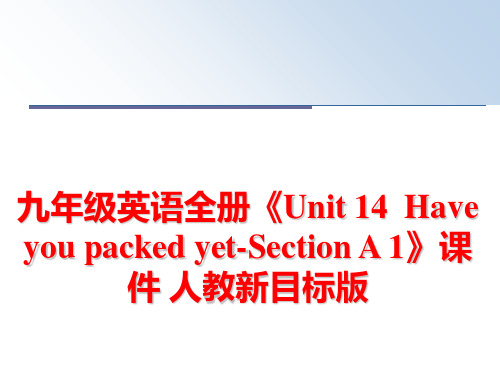
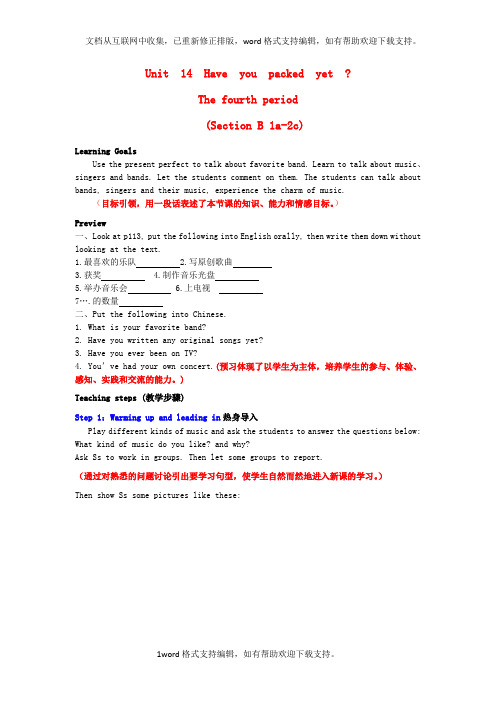
Unit 14 Have you packed yet ?The fourth period(Section B 1a-2c)Learning GoalsUse the present perfect to talk about favorite band. Learn to talk about music、singers and bands. Let the students comment on them. The students can talk about bands, singers and their music, experience the charm of music.(目标引领,用一段话表述了本节课的知识、能力和情感目标。
)Preview一、Look at p113, put the following into English orally, then write them down without looking at the text.1.最喜欢的乐队2.写原创歌曲3.获奖4.制作音乐光盘5.举办音乐会6.上电视7….的数量二、Put the following into Chinese.1. What is your favorite band?2. Have you written any original songs yet?3. Have you ever been on TV?4. You’ve had your own concert.(预习体现了以学生为主体,培养学生的参与、体验、感知、实践和交流的能力。
)Teaching steps (教学步骤)Step 1:Warming up and leading in热身导入Play different kinds of music and ask the students to answer the questions below: What kind of music do you like? and why?Ask Ss to work in groups. Then let some groups to report.(通过对熟悉的问题讨论引出要学习句型,使学生自然而然地进入新课的学习。
《Unit 14 Have you packed yet》单元综合测试题I. 根据句意及首字母提示,完成单词。
1. I c _____________for a long time with my grandfather on the phone yesterday.2. Be o _____________the lake. It’s too dangerous.3. When my grandfather was a kid, he had to get up at 5 am and c__________ wood and l _____________ the fire for breakfast.4. They gave the money to a charity for h__________ children.5. My aunt owns a farm and she has many animals to f_____________.6. Some people often go to places of interest for s_____________.7. He has parked his car in the g_____________.8. Please p _____________everything necessary before you travel.9. The new bathing s _____________on you is really cheap and beautiful.10. R _____________are used for keeping food fresh.Ⅱ. 选择填空。
( )1. I have_____________things to do.A. too muchB. much tooC. so muchD. so many( )2. —Have you finished your homework _____________?_____________—Not_____________. I’ll need another hour.A. already; alreadyB. ever; alreadyC. yet; alreadyD. yet; yet( )3. —Look! There is no grass and no soil in_____________this area. What a sad_____________!—Yes, we have to do something to change it.A. situationB. showC. sceneD. chore( )4. —Could you talk about _____________?—Sure. I’d love to.A. other somethingB. else somethingC. something elseD. everything else( )5. —May I speak to Dave, please?—Sorry. He’s_____________England.A. gone toB. gone inC. been toD. been in( )6. —Did your father smoke a lot?—No, he didn’t. But he_____________that.A. used to doB. used to doingC. was used to doD. was used to doing( )7. —_____________to turn off all lights before you _____________leave the office.—I won’t forget, Ms Si.A. UntilB. Be sureC. BecauseD. Though( )8. —I missed the wonderful football match _____________last night._____________—_____________.A. Don’t worryB. It’s nothingC. What a pityD. Don’t say thatⅢ. 将下列句子改写为现在完成时态。